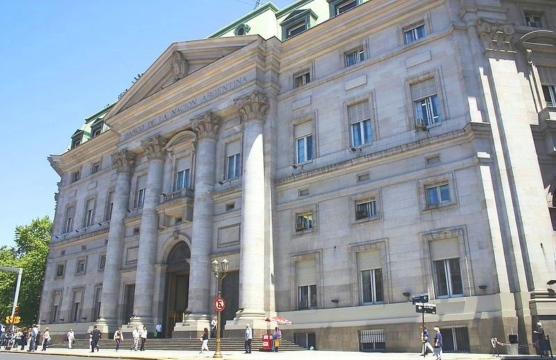
Will Default Dampen China-Argentina Ties?
The Fernández administration’s refusal to comply with a US court order to pay holdout hedge funds has once again landed Argentina in default.
This post is also available in: Spanish
When she cast her vote on Sunday, outgoing President Cristina Fernandez de Kirchner said: “Argentines are voting in a normal country.” She was right. In one of the most surprising elections since the return of democracy in 1983, Daniel Scioli—presidential candidate for the Kirchnerist Front for Victory—won by a mere 2 points against Mauricio Macri, mayor of the City of Buenos Aires and candidate of the opposition front Cambiemos (Let’s Change). They will face each other in the first runoff in Argentinian history, on November 22.
Although few anticipated these results, some possible explanations emerge: 1) Scioli was unable to be the Kirchnerist candidate and represent the beginning of a new political cycle at the same time. 2) After accepting Scioli’s candidacy, Cristina Kirchner chose loyalty over electoral appeal, and picked unpopular candidates for the vice presidency and the governorship of the strategic Province of Buenos Aires. 3) Although Kirchnerism defends its 12 years in power by comparing them to the 2001 crisis, Argentinians seem to have been more motivated by the recent economic stagnation than many expected.
Close to midnight, after 6 hours without any official information, the unexpected was confirmed: Contrary to what all polls had predicted, the difference between Scioli and Macri was minimal (36.8% to 34.3%). Sergio Massa, a dissident Peronist, came in third, with 21.3%. Leading up to election day, the question for most observers was whether Scioli would beat Macri by more than 10%—the necessary difference to triumph on the first round. He wasn’t even close. In fact, Scioli’s tally was 2 points lower than the primary elections last August, while Macri’s jumped by 4 points. Overall voter turnout topped 80%, an all-time high.
Undoubtedly the biggest surprise was the Cambiemos candidate—María Eugenia Vidal—who pulled off an upset victory in the Province of Buenos Aires (by far the largest in the country, with 37% of the population). Vidal –currently Macri’s vice mayor- will be the first non-Peronist governor since 1987. She obtained more votes than Macri himself in the province, and defeated Anibal Fernandez, the disliked Kirchnerist candidate and current Chief of Staff to President Cristina Kirchner. His unpopularity, as a hardcore Kirchnerist, likely had broader implications too, dragging down Scioli’s performance and allowing Cambiemos to take over over many important cities of Greater Buenos Aires, areas that had been ruled by Peronism for decades.
On Sunday Argentina also elected half of the Chamber of Deputies and a third of the Senate, a cornerstone of power for the next government. In the former, the Front for Victory lost its absolute majority but will remain the biggest party. In the Senate, Kirchnerism will remain in control. Cristina Kirchner will have an important number of loyal lawmakers on both chambers—many answering only to her—including her son, Máximo Kirchner, who was elected as a deputy.
Until yesterday, Mauricio Macri was criticized for not presenting a strong alternative to the continuity of Kirchnerism that Scioli represented. Now, Macri enters the second round with the momentum of his strong performance, practically evaporating the advantage Scioli held a few months ago. From now on, Macri will have to turn his sights to Massa’s voters and earn the trust of those who do not want Scioli to win, many of whom fear he would lead a return to the neoliberal policies that lead to the economic and political collapse of 2001. Macri will have to attract these voters by promising to preserve some social policies implemented under the Kirchners, and convincing them that he would be able to govern effectively even without controlling Congress or most of the provinces.
The next steps for the incumbent president aren’t clear. She can either campaign for Scioli, hoping to push through a party win, or fall silent, to Macri’s benefit, in order to become leader of the opposition. Cristina Kirchner remains popular –with about 50% of favorability- and her influence could be decisive for the second round. If Scioli is defeated, she could remain in control of Peronism, and attack a potential Macri administration from the left. Doing so would take advantage of the likely unpopular economic measures that the next government would have to implement to put the economy back on track. Yet it would also risk seeing many of her accomplishments be dismantled under a Macri government.
The results show Scioli’s political difficulties: he is the Kirchnerist candidate but at the same time must set himself apart to win in the runoff. As governor of the Province of Buenos Aires he was able to maintain a strategic ambiguity and differentiate himself from some Kirchnerist policies, but this was not enough for a presidential campaign. The presence of Carlos Zannini—a party loyalist handpicked by President Kirchner—as his vice presidential candidate and Anibal Fernandez as candidate for governor of Buenos Aires trapped Scioli intro hard-core Kirchnerism and diluted his image as a moderate, a label he will have to regain quickly.
The dissident Peronist was able to maintain the share of the vote he obtained in the primaries, and will be a key actor for the second round. Although Massa was once part of Cristina Kirchner’s government, his victory in the legislative elections of 2013 ended her attempt to modify the constitution to run for a third term. This makes Massa’s return to Kirchnerism unlikely. Undoubtedly, Massa will demand concessions from Macri in terms of public policy and political positions in exchange for his support. However, Massa’s voters still might not follow his instructions, and an important percentage of them—those who see themselves more as “Peronist” than “dissident”—will fall back behind Scioli.
Whoever wins in November, the situation of the next government will be daunting. As we have stated before, the economic inheritance that Cristina Kirchner will leave to her successor is very complex: a stagnant economy, inflation of over 25% a year, a growing fiscal deficit, and scarce foreign currency reserves in the Central Bank.
At the same time, the new president will also have to deal with a much more fragmented political environment. Cristina Kirchner and her husband ruled with almost absolute control over the institutional instruments of the state: a solid majority in Congress –lost only from 2009 to 2011- and Peronist control over most of the provinces. If Macri wins, he will need to negotiate with Peronist governors in most districts, and reach legislative agreements in order to rule. And if Scioli is the next president, his challenge will be to sideline Cristina Kirchner and become the undisputed leader of Peronism.
Whatever the final result, Argentinians have voted for a more equal distribution of political power. Accordingly, the capacity to reach consensus will now be the key for the years to come.
The Fernández administration’s refusal to comply with a US court order to pay holdout hedge funds has once again landed Argentina in default.
Column on the results of the 2007 PISA exam.
Article discusses Argentina’s ban on publishing the results of student achievement tests and its implications for education quality.
